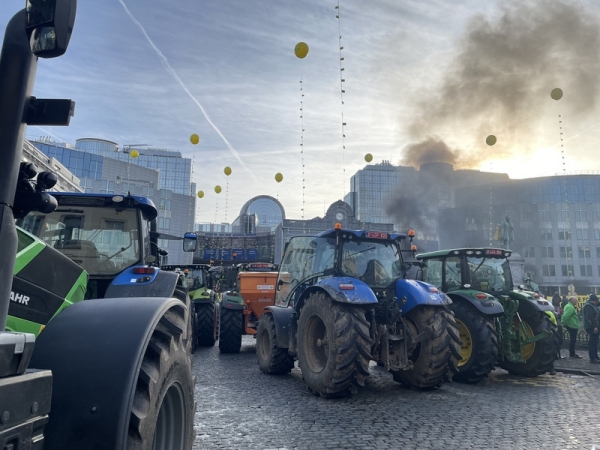Farmers call for ‘fair prices’ and set fires in Brussels protest
Fair prices, less red tape and a longer lead-in time and more subsidies for the green transition were the demands of thousands of European farmers who protested outside the European Parliament on Thursday (1 February) — which saw fires set and police firing tear gas.
As EU leaders met for their summit in Brussels to discuss aid to Ukraine, around 1,300 tractors blocked the perimeter of the institutions and farmers held banners reading "This Is Not The EU We Want" and "Free Farmers, Stop Free Trade".
-

Piles of wood were set alight, a few small explosions were heard, and even the statue in the middle of Luxembourg Square was toppled and vandalised (Photo: Paula Soler/EUobserver)
After the summit, Belgian prime minister Alexander De Croo, Dutch prime minister Mark Rutte and EU commission president Ursula von der Leyen all met with a delegation of farmers in Brussels.
"The concerns that they have are partly legitimate," De Croo told reporters ahead of the summit.
"We need to make sure that our farmers can be a part of this [climate transition]," De Croo said, stressing that the EU also needs to make sure that the administrative burden remains reasonable and that farmers can get the right price for their products.
He also admitted there is a "lasagna effect" currently affecting farmers — referring to increasing administrative burden coming from Green Deal rules, controversial nature restoration regulations and pesticides proposals.
Flames
Some farmers from as far afield as Portugal, Spain, Italy, the Netherlands, Belgium and France had already arrived in Brussels on Wednesday evening.
However, early on Thursday fires were set in streets outside the European Parliament building.
No one wanted to accept responsibility for the chaos and violence of the protests, but Bart Dickens, president of the Belgian Farmers’ Defence Force, had said it was time to "go hard" after feeling unheard by politicians in Brussels and EU capitals.
"You must have a statement, and you must say that Belgium is on fire, Europe is on fire," he said, pointing out that protests across Europe were about farmers’ livelihood, insisting it was not another far-right protest.
"We can’t breathe, because when we breathe there’s a new rule, so they put us down," Dickens said, raising concern about the impact of red tape on farmers and the lack of connection between politicians and the reality on the ground.
In recent years, farmers have been dealing with the effects of the Covid-19 pandemic, higher fuel prices and production costs due to an energy crisis, and the impact of the war in Ukraine on food prices and market competition.
But first thing on Thursday, the scene was one of glasses being thrown to the ground, piles of wood being set alight, a few small explosions in the background and even the statue in the middle of Luxembourg Square in Brussels being toppled and vandalised.
"It’s a bit extreme, but at the other end, the politicians in Brussels are the ones who are destroying everything," Robert Roos, vice-president of the rightwing ECR group in the parliament, told EUobserver about the atmosphere of the protests.
According to the Dutch MEP, the problem is trade deals and the EU’s dependence on other parts of the world, but most of all green plans.
"The green deal, that is the bureaucracy, it is about controlling the farmers," he said, adding: "They just want a fair price for the food they produce".
On Wednesday, the EU executive announced measures to limit cheap agricultural imports from Ukraine in an attempt to calm concerns in neighbouring countries.
The proposal has not yet been given the green light by the parliament and EU member states, but once approved it will allow tariffs on products such as poultry, eggs and sugar if imports from Ukraine exceed average levels in 2022 and 2023.
Also on Wednesday, the EU executive announced that it would allow EU farmers to benefit form some derogations for the year 2024 under the Common Agriculture Policy, in a significant climbdown to the protestors.
Protests are also calling for a halt to the Mercosur trade agreement with Latin American countries, or even "free trade agreements" in general, as they see it having a negative impact on local markets.
"We have a lot of products that are coming from countries with cheaper prices than ours and from countries that have rules that are not that strictly [enforced]" a young farmer coming from the north of Italy told EUobserver.
"We don’t want markets to be sealed off, but we do want everything that comes into Europe to be subject to the same rules," said José María Castilla of the Spanish Federation of Young Farmers, claiming that EU rules are making their production less competitive.
Asked about the situation on the ground, the young Italian farmer lamented: "The difference between what the farmer is being paid and what the consumer is paying for the product at the supermarket is huge."

